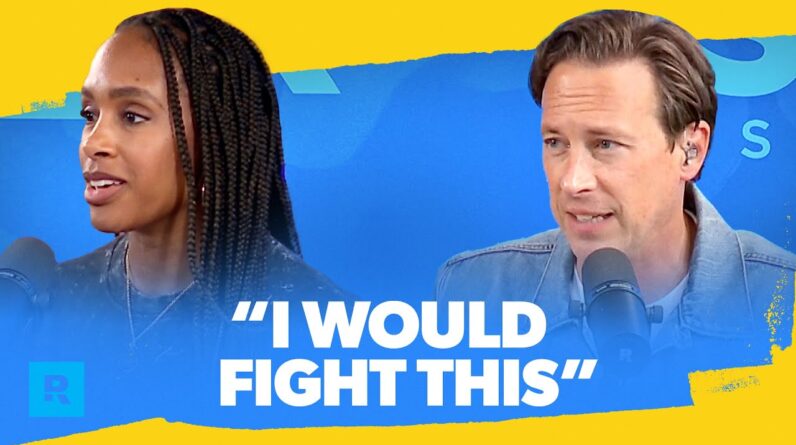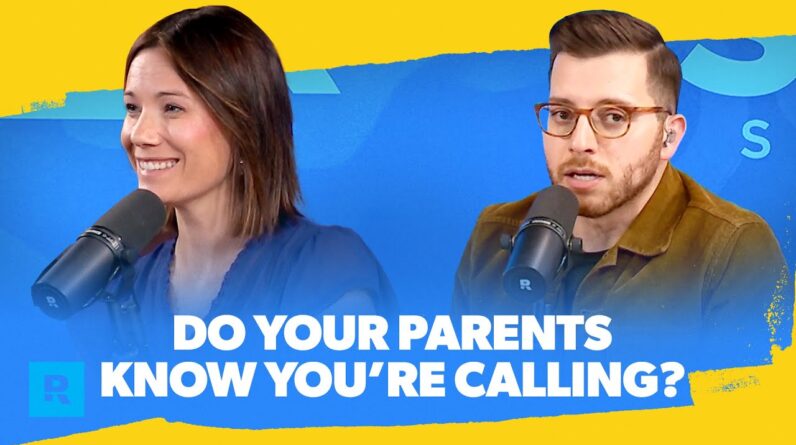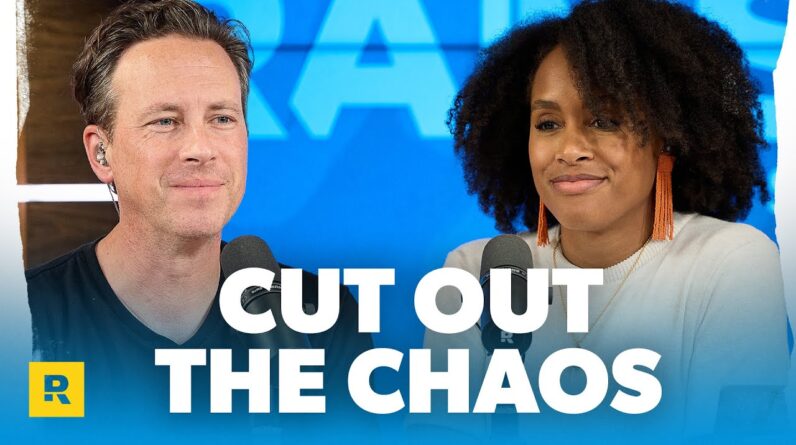
[Music] well hey you guys so other than hey Rachel where your earrings from or can you link that dress from Amazon we want it those are the most common questions that I get when it comes to life on social media but besides those investing is the next I mean Beyond budgeting and getting out of debt investing is always the top question that I get when it comes to money now it can be tricky to understand this topic at first but once you grasp the basics of investing and you know all of your options you will be unstoppable when it comes to wealth building so today I'm going to respond to a couple of your investing questions and be sure to watch till the end and let me know in the comments if I missed anything that you're still wondering about and stick around to hear about my go-to tips for investing no matter where you are in the process so I'll do this every now and then on Instagram I'll just say hey ask me a question and these that you're about to hear were questions from you all via Instagram when it comes to investing so the first one is when where and how can I open up a Roth IRA if I don't have this option through work so a Roth IRA you can do completely as an individual you have to be working and making an income in order to qualify for a Roth IRA but also if you're married your spouse if your spouse stays at home they can qualify for a spousal Roth IRA which is great so what you would do I would suggest that you sit down with investment professional and look at your entire investment strategy completely everything from your 401k at work or 403b to the Roth IRA I mean look at everything and have them help you that would be the best option in my opinion all right the next question is I'm a teacher with a pension and a 403b and I'm wondering if it's a good idea to start a Roth IRA as well so the way I answer this question is to say if you are debt-free with a fully funded emergency fund I want you investing 15% of your income and so what you're going to do is go up to the match of your 403b your pension I would cut in half so take that percentage that you're getting pension wise and cut it in half towards your 15% because that is money going towards retirement which is great but you also have no control over where they're investing that money when it comes to your pension and I want more options for you so if you have more of that 15% that's not allocated then I would open up a Roth IRA and invest in that as well so you can technically have three accounts which is great right but again the key here is that you're investing up to 15% of your income next is when or after which Step do you recommend converting a traditional IRA to a Roth IRA will I be penalized for doing this okay so I love the Roth IRA and quickly what that means Roth means basically taxfree you're like sheltered from taxes which means you are putting money in you can put up $7,000 in this year and what you're taking is money that's already been paid taxes on your income so you're your income comes in you pay taxes whatever hits your account that's the money you use to fund your Roth IRA which means the growth within that is completely tax-free so if you're starting this early you're going to have so much growth you're going to have more growth in that funds versus what you put in the principal so I think that this is so important I think it's really key to do a Roth IRA now a traditional IRA is taken out before you pay taxes so you almost don't even really see it and then money hit your checking account and whatever there is yours to live off of but the problem is whatever the growth is in the traditional IRA you're going to pay taxes on when you pull it out at $59 a half or whenever you take money out which is going to be a lot you're going to pay a lot of taxes so again there's a lot of debates between this on what you should do depending on your tax bracket and all of it but I'm a fan of the Roth so if you're going to convert it again I would sit down with an investment professional to talk about this because if you're far down the line in a traditional it actually may not be worth it because you're going to be taxed in order to roll it over to a Roth IRA you're going to have to pay taxes which means you're going to have to have cash it's going to be taxed like ordinary income so it's going to take a chunk of money but again on the offset of whatever is going to grow in that funds is going to offset the taxes you pay now it's going to be worth it but again it's going to depend on your age and how much you have in there the next question is my husband withdrew the cash from his 401k from his old job it was $99,000 we're currently on baby step 2 so should we just toss it at our debt yes go ahead if the cash is there everything is going towards the debt now remember you guys if you move jobs your 401k do not cash it out because you lose the benefit of all that growth so the 401K if you have it just roll it over to a traditional IRA like we just talked about earlier so again you're not paying taxes or anything you're just rolling over letting that sit there and grow over time and then you can open up a new 401K at your new job but do not cash it out next time because you lose growth and you can be penalized all right next is what is the best way to save for retirement as a stay-at-home mom so this is a great question so retirement specifically if you don't have an earned income but your spouse does again you can do that spousal Roth IRA is what I would recommend but other than that you may just be investing in traditional mutual funds or index funds at that point so again the retirement option really is when you have a earned income but if you don't there's really limited options my daughter's going to college next year debt-free scholarship a$ 529 fund great job she bought her car in cash amazing she has a couple of thousand in savings and works a part-time job for extra spending money should she start investing now well done golly that's amazing okay so while again I love investing I love talking about compound interest I love talking about the earlier you start the better off you're going to be all that but the truth is when you are 17 18 19 20 years old there is a a lot of life ahead of you and an expensive life right that transition from college to the real world it's expensive maybe you get a new job you got to move cities there's moving costs you're trying to figure out rent and I mean there's a lot to be said when it comes to entering in life and so really the best investment you can make is in yourself meaning having a lot of cash on hand when you're young is really really helpful and so what I would tell her to do is just put that in a high yield savings account I understand the temptation of like go ahead and invest it I get it but also I don't want her money stuck in an investment and in 3 years she actually really needs it for something again it's going to put her in a hole so I would rather her have it available and then when she transitions out of college she gets her first job then she starts saying okay now we're going to be you know investing and all of that that money she saved as a teenager could be her baby step three which is a fully funded emergency fund so maybe she has that cash there check and she can go straight to investing then so investing at 21 versus you know 19 she's going to be okay so I would not invest now my husband will lose the match if we roll over his 401k to his employer should we still move it so I'm assuming that means his 401k from his old job so if that's the case I would just roll it over to a traditional IRA and then open up a new 401K which hopefully then has a match but if it's new 401K doesn't have a match I would still go ahead and invest it I would just prioritize a Roth IRA over a non-matching 401k the next is I'm investing 11% in retirement through work and my company is matching 4% of that so I'm sitting at 15% total I don't feel like I have a lot of margin to do 15% on top of the match so is that still good enough so when we talk about the 15% it does not include your employer's match so technically you are investing only 11% of your income so again I understand yeah it is margins are tight and all of that so if it's for a season and it's what you can do to get by that's great but as your income starts going up then I would still really hone in on that 15% that needs to be your goal let's just say that that needs to be your goal is investing 15% so you may not be in a current position today to cover everything you need and invest 15% but I don't want you sitting at 11% long term because when we look at inflation when we look at growth within funds all of that I want you to be in a really comfortable place at retirement age and that 15% really is that magical number the next is how do I know when it is a good time to increase the percentage of money that goes towards retirement investing well again I always go back to that 15% so I would do anything I could if you are debt-free with a fully funded emergency fund to max out and get to that 15% of your income and really that's what you need for retirement and investing now if you're down you know the baby steps and maybe you've you know your kids college is taken care of maybe you've paid off your house even and you're looking to invest that's when you can really go in and invest in other things besides retirement but that 15% specifically within retirement Investments is really key now the last question is one that really fascinates me because it's something that Skeptics tend to wonder about but before I share with you what that is I want to tell you about one of our new sponsors that's joining the show and that is delete me so you guys scammers are everywhere it's crazy and I'll admit not too long ago I was a little distracted and actually fell for a scam yes hurt my heart a little bit I know and I know that again scams are common There Are Places out there that are going to have your data and so what you want to do is protect yourself and so that is why I recommend delete me this gives me such peace of mind because delete me finds and removes your personal info like your home address phone numbers and more from hundreds of data broker websites helping protect you from spammers scammers and online thieves and it potentially will be saving you a lot of time and even money to go through and say oh my gosh where is all my information and can I just tell you when you sign up with them they're going to show you already all these places where your information is I mean it's crazy what is on the internet and how people can find you so you got to check out delete me so if you go to join delet me.com Rachel you can get 20% off that's join delet me.com Rachel all right the final question is does it ever make sense to invest in something other than retirement like investing in mutual funds to save for a house so it's a great question yeah absolutely there is uh but for a lot of people again that we talk to it's like okay getting out of debt is a priority first getting a emergency fund NE is next and then making sure retirement is taken care of so once those things are covered and your house is paid off and you're beyond that and you're just say okay where can I invest There Are Places and great things you can invest in really the two places I can tell you beyond retirement that Winston I invest in is that we have just a standard mutual fund that we opened um also index funds is a great option too if you want to check those out and paid for Real Estate which is starting really really small it's not a great market for it to find great deals but you can still find them out there so if you wanted to do that and whether you're knowledgeable in that area of life and you can do a flip and make some money that's great or maybe you hold it for a rental so I would invest back into the market in non-retirement funds or real estate those are the two places that I feel the safest but no if you're saving up for a house usually if you're going to have a purchase within 5 years I would just put money in a high yield savings account but if it's going to be longer than 5 years and you're like yeah you know this money let's just see if it grows and you don't really need it for something specific you could open up another fund like a mutual fund and just park some money there cuz here's the thing you guys no matter where you fall in the investing Journey whether you're still paying off debt still working towards investing a full 15% there are a few tools that I recommend in this process so use Ramsay's investment calculator to really help you plan and track your investment goals because this is a great place where you can put some numbers in and just see hey what if we did this and we let it grow for 10 years what is it going to be or for retirement hey if we want this much at retirement because this is how much we live off each year what do we need to have so again it's a great tool to use and also consider working with a pro I'll be sure to leave the info that you need in the description so that you can get started making progress today and if you haven't be sure to check out my episode on investing for total beginners so good luck you guys on your investment journey and as always remember to take control of your money and create a life you love







